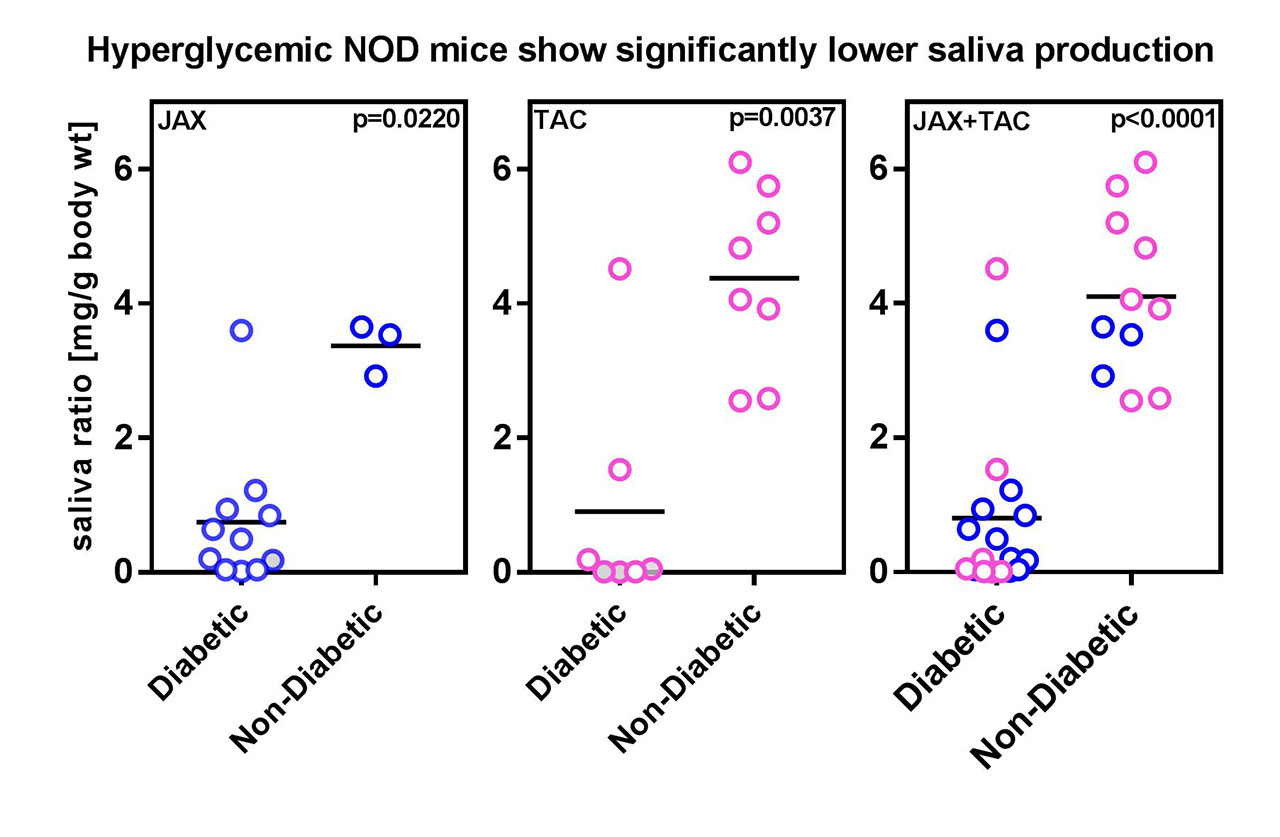Session Information
Session Type: Poster Session (Monday)
Session Time: 9:00AM-11:00AM
Background/Purpose: It has been demonstrated that the non-obese diabetes (NOD) mice from the Jackson Laboratory (JAX) have a distinct gut microbiome and higher incidence of type I diabetes than NOD mice from the Taconic Biosciences. Since the female NOD mice recapitulate several features of Sjögren’s syndrome, this study was undertaken to test the hypothesis that the incidence and severity of Sjögren’s syndrome-like disease will be distinct in NOD mice from JAX and Taconic.
Methods: Seven week old female NOD mice were purchased from JAX (n=15) and Taconic (n=15). Mice were monitored at different time points for hyperglycemia (non-fasting blood sugar >250mg/dL), pilocarpine-induced salivation, serum IgG levels, ANA, and circulating cytokines. Mice were euthanized at 22wk of age, and submandibular glands were evaluated for the presence of inflammatory foci and antibody deposition.
Results: At 20 wks of age, 80% of JAX mice were hyperglycemic, in comparison with only 46% from Taconic. The JAX mice had significantly higher total serum IgG (p=0.0007), IL-2 (p=0.0009), IL-6 (p=0.0287), TNFα (p=0.0447) and IP-10 (p=0.013) levels than the Taconic mice. The incidence of ANA was similar between the two groups. Although the severity of sialoadenitis was significantly higher in Taconic mice (p=0.0289), the loss of saliva production was more prominent in JAX mice. Surprisingly, a trend of higher saliva production was seen in mice with higher salivary gland inflammation. In both groups, the hyperglycemic mice had significantly lower (p< 0.0001) pilocarpine-induced salivation than mice with normal blood sugar levels. Furthermore, hyperglycemia was significantly associated with higher circulating IL-1β (p=0.0174), IL-16 (p=0.007) and lower IL-10 (p=0.0227) levels.
Conclusion: Our data demonstrate that in the NOD mouse model for Sjögren’s syndrome, salivary gland dysfunction is strongly associated with hyperglycemia, rather than the ANA response and the level of salivary gland inflammation. Our data suggest that metabolic syndrome should be evaluated in SS patients and efforts made to reduce hyperglycemia.
To cite this abstract in AMA style:
Allushi B, Papinska J, Bagavant H, Deshmukh U. Salivary Gland Hypofunction in a Mouse Model for Sjögren’s Syndrome Is Strongly Associated with Hyperglycemia [abstract]. Arthritis Rheumatol. 2019; 71 (suppl 10). https://acrabstracts.org/abstract/salivary-gland-hypofunction-in-a-mouse-model-for-sjogrens-syndrome-is-strongly-associated-with-hyperglycemia/. Accessed .« Back to 2019 ACR/ARP Annual Meeting
ACR Meeting Abstracts - https://acrabstracts.org/abstract/salivary-gland-hypofunction-in-a-mouse-model-for-sjogrens-syndrome-is-strongly-associated-with-hyperglycemia/

